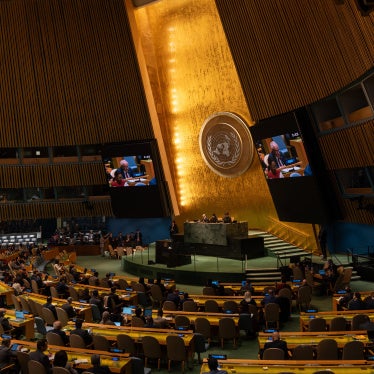Human Rights Watch warmly welcomed the decision by the Security Council to recommend to the General Assembly the reappointment of Kofi A. Annan for a second term as the United Nations Secretary-General. Earlier today, the Council unanimously chose the Ghanaian to serve for another five years as the world organization's seventh head.
"Of all the secretaries-general to date, Annan has best understood the centrality of human rights to the work of the United Nations," said Joanna Weschler, Human Rights Watch's United Nations representative. "His reappointment is a real victory for human rights."
From the moment he took his job in January 1997, Annan has spoken frequently, forcefully and truthfully about human rights. In his first press conference as Secretary-General in what was at the time a revolutionary statement, he stressed the importance and role of human rights in four main areas of U.N. activity: peace and security, humanitarian affairs, economic and social affairs, and development. Since then, he has taken numerous practical steps to integrate human rights into these areas of work.
The Secretary General has been particularly forceful in linking human rights with security issues and has repeatedly emphasized the imperative to address human rights issues when addressing conflict situations.
He has been unequivocal in his support of international justice. For example, he backed the creation of the International Criminal Court despite opposition from some of the U.N.'s most powerful members. He also instructed his negotiator to write a disclaimer renouncing an amnesty for a Sierra Leonean rebel group with an atrocious human rights record, at the conclusion of a Sierra Leone peace accord in 1999.
In what has come to be known as the "Annan Doctrine," he has repeatedly stated that state sovereignty must not shield states in the face of crimes against humanity. During the wave of post-referendum violence in East Timor in the fall of 1999, he warned that senior Indonesian officials risked prosecution for crimes against humanity if they did not consent to the deployment of an available multinational force. They quickly relented.
He also undertook several important initiatives meant to revise the internal workings of the United Nations on matters of significance for human rights. Among other things, he commissioned an independent report to investigate the role of the world organization in failing to prevent the 1994 genocide in Rwanda, and in 2000 he asked for a thorough review of the U.N.'s peacekeeping operations.
He has not shied away from confronting leaders of major powers about their human rights practices. For example, last month in Moscow, he urged Russia's president Putin to allow U.N. investigators to conduct missions to the region of Chechnya, something the Russians have resisted for more than a year.
Some of Annan's human rights efforts have yet to bear fruit. Several of his panel's recommendations on peacekeeping, in particular those regarding a substantial enhancement of the planning and preparation capacity of the Office of the High Commissioner and its ability to second personnel to mission task forces in New York, have yet to be implemented. His "Global Compact" for integrating human rights and other social values into the operations of multinational corporations has yet to move from a talk shop to a forum for developing enforceable standards.
Despite much effort, he has yet to secure funding for a Sierra Leone tribunal, personnel for a human rights component of the U.N. mission in the Democratic Republic of Congo, and increase the share of the U.N.'s regular budget that goes to human rights. These are among the challenges facing Mr. Annan in a second term.
"We hope Annan's second term will allow him to consolidate some of the work that has only begun, such as the implementation of the recommendations regarding peacekeeping, or making his human rights global compact with the business community more meaningful," Weschler said. "In order to make his human rights legacy lasting, he also needs to work on significantly increasing the still woefully inadequate resources for the Office of the High Commissioner." The General Assembly is expected confirm this decision on Friday.






